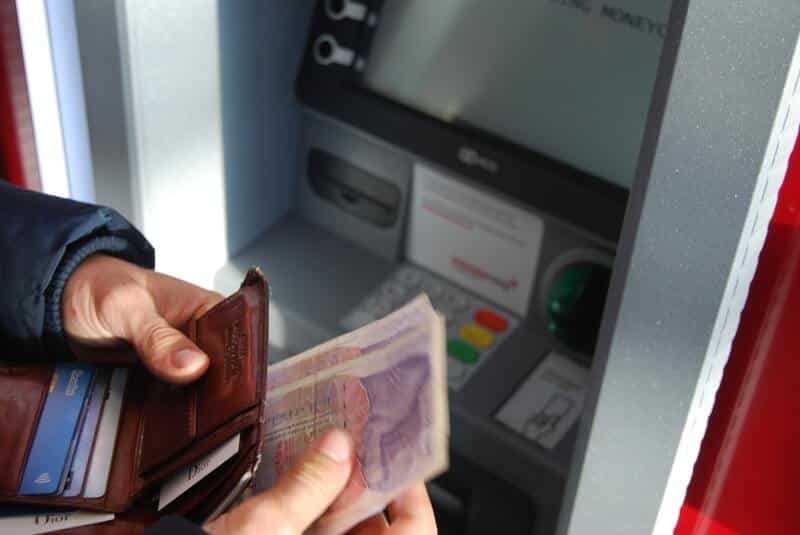The UAE’s rapid economic growth has led to a massive increase in demand for financial services. In particular, a UAE bank account for non residents has become increasingly popular in recent years due to the country’s growing economy and favorable financial landscape.
According to the Central Bank of UAE, non-resident deposits in the country amounted to AED 158 billion ($42.9 billion) in 2019. This indicates a significant increase from previous years and highlights the growing popularity of non-resident banking in the UAE.
This can be attributed to the country’s growing popularity as an attractive destination due to its favorable tax laws, stable economy, and high-quality financial services.
Today, the banking sector in the UAE is considered one of the most advanced and sophisticated in the Middle East. With numerous world-class institutions operating in the region, banking in UAE has become a crucial component of its financial infrastructure.
If you are looking to invest as an expat or high-net-worth individual, which is what I specialize in, you can email me (advice@adamfayed.com) or WhatsApp (+44-7393-450-837).
This article is for informational purposes only, and isn’t any sort of advice or endorsement.
What are the advantages of having a UAE bank account for non residents?
Having a UAE bank account for non residents offers numerous advantages for individuals and businesses looking to manage their finances effectively in the region.
For one, a non-resident bank account in the UAE provides individuals and businesses convenient access to financial services, enabling them to manage their finances more effectively and securely.
Non-resident bank accounts allow individuals and businesses to access their funds easily without physically being in the UAE. This is especially useful for individuals and businesses that frequently travel abroad.
It also enables individuals and businesses to take advantage of better exchange rates, as they can access their funds in the local currency of their home country.
A non-resident bank account is also important to ease business operations, especially for companies and individuals who operate in multiple countries or have cross-border transactions.
It enables businesses to focus on growing and achieving their goals by streamlining transactions and offering increased security.
It also helps reduce tax liabilities, providing greater tax planning opportunities and improving compliance with tax regulations.
Most importantly, a UAE bank account for non residents offers increased financial privacy, as it is not subject to the same reporting requirements as resident bank accounts. This can help individuals and businesses protect their financial information and reduce the risk of fraud or identity theft.
What are the eligibility criteria for getting a UAE bank account for non residents?
Several eligibility criteria must be met to open a UAE bank account for non-residents. These criteria are established to ensure that the bank has the necessary information and documentation to open the account and maintain compliance with local regulations.

Citizenship and residency requirements
Firstly, individuals must meet the citizenship and residency requirements set by the bank. These requirements may include proof of citizenship, proof of residency, a valid residency visa, and proof of employment.
Non-resident individuals must provide proof of citizenship, such as a passport or national identity card. The passport must be valid for at least six months beyond the expected length of stay in the UAE.
They must also provide proof of their current address, such as a utility bill, bank statement, or rental agreement. In some cases, the bank may require a letter from the applicant’s employer confirming their employment and current address.
Those employed in the UAE must have a valid residency visa and provide proof of their employment. The visa must be valid for at least six months beyond the expected length of stay in the UAE, while proof of employment could be a letter from their employer or a recent salary slip.
Age and financial requirements
Along with citizenship and residency requirements, non-resident individuals must also meet certain age and financial requirements to open a UAE bank account.
Most banks in the UAE require non-resident individuals to be at least 18 years of age to open a bank account. Some banks may have a higher age requirement for certain types of accounts.
Non-resident individuals must also provide proof of their income, such as a recent salary slip, bank statement, or tax return. This information is used to assess the account holder’s financial stability and ensure they have sufficient funds to support their financial transactions.
Some banks may also require non-resident individuals to maintain a minimum balance in their bank accounts. This requirement may vary depending on the bank and the type of account.
Others check the credit history of non-resident individuals to assess their financial stability. A good credit history can increase the chances of approval for a bank account.
Those who own a business may be required to provide financial statements to the bank. This information is used to assess the business’s financial stability and ensure it has sufficient funds to support its financial transactions.
Documentation requirements
Finally, non-resident individuals must also provide the necessary documentation to open a UAE bank account. These documents are used to verify the account holder’s identity, address, and financial status and comply with local regulations.
Aside from the citizenship, residency, employment, and financial capacity documents, some banks may also require a letter of authorization signed by the account holder, allowing the bank to obtain information about their financial history.
Meanwhile, non-resident individuals who own a business must provide business registration documents, such as trade licenses, tax identification numbers, and financial statements.
What are the types of UAE bank accounts for a non resident?
Non-resident individuals in the UAE have various bank account options to choose from to manage their finances. Each option offers unique benefits and features that cater to the specific needs of non-resident individuals.
Current Account
A current account is a type of bank account designed for day-to-day financial transactions and primarily used for business purposes.
Non-resident individuals in the UAE can open a current account to manage their daily financial transactions, including paying bills, receiving a salary, and making and receiving payments.
A current account may provide access to an overdraft facility, which allows non residents to withdraw funds in excess of their account balance. This can be useful for managing unexpected expenses or cash flow issues.
Current accounts also usually come with a cheque book, which can be used for making payments and managing finances.
Most banks in the UAE also offer online banking facilities, which allow individuals to manage their current accounts from their computers or mobile devices.
However, current accounts may come with high maintenance fees, which can be a disadvantage for non-residents who are on a tight budget.
It typically offers low-interest rates compared to other types of bank accounts.

Savings Account
A savings account is a type of bank account designed to help individuals save and earn interest on their deposits.
Non-resident individuals in the UAE can open a savings account to grow their savings and earn a return on their money.
Savings accounts typically offer higher interest rates compared to current accounts, which can help non-residents grow their savings faster.
It is a safe option for storing money, as the Central Bank of the UAE insures the deposits.
Savings accounts are also highly liquid, so non-residents can easily access their money when needed.
Some savings accounts, however, may come with low withdrawal limits, which can be a disadvantage for non-residents who need to access their money frequently.
It also has maintenance fees, which can be a burden for non-residents who are on a tight budget.
Fixed Deposit Account
A fixed deposit account is a type of savings account that allows individuals to deposit a fixed amount of money for a fixed period and earn a higher interest rate.
Non-resident individuals in the UAE can open a fixed deposit account to earn a higher return on their savings.
It typically offers higher interest rates than other bank accounts, which can help non-residents grow their savings faster.
The interest rate on a fixed deposit account is also guaranteed, which means that non-residents can be sure of the returns they will receive on their investments.
But, fixed deposit accounts have low liquidity. Also, non-residents who withdraw their funds before the end of the fixed deposit period may incur penalties, which can reduce the returns on their investment.
What is the best UAE bank account for non residents?
The best type of UAE bank account for non-residents will depend on their financial needs and goals. It is important to consider all the options available and choose the best account that suits your financial needs.
The first step is to understand your financial needs and goals. Consider the accessibility of your funds, such as the bank’s location, ATM network, and online and mobile banking options.
Compare interest rates offered by different banks to find the best return on your money. Look for a bank that provides low or no fees for account maintenance, overdrafts, and other services.
Choose a bank with good customer service that is easily accessible, responsive, and knowledgeable. Ensure that the bank you choose is secure, has a strong reputation, and is regulated by the Central Bank of the UAE.
Consider the convenience of opening an account, such as the required documentation and ease of the application process. Look for a bank that offers other services, such as loans, investments, and insurance, that may benefit you.
It is also recommended to compare several banks and consult with a financial planner to ensure that you make the best choice for your specific needs.
How to open a UAE bank account for non residents?
Opening a bank account in the UAE for non-residents is straightforward. However, it could take time, depending on several factors. On average, it can take anywhere from 1-2 weeks to a few months to open a bank account in the UAE as a non-resident.
To open a UAE bank account for non residents, choose a bank that meets your needs and requirements, such as accessibility, interest rates, fees, customer service, security, and convenience.
Prepare the necessary documentation, such as a passport, visa, proof of residency, and proof of income. Some banks may also require additional documentation, such as a reference letter from your current bank or proof of address.
Then, schedule an appointment with the bank to discuss your account options and submit your application and required documentation.
During your appointment, you must provide a valid passport, visa and proof of residency, such as a utility bill or lease agreement.
Fill out the bank account application and provide any additional information or documentation that may be required. Complete the onboarding process, which may include signature cards, signature specimens, and setting up online or mobile banking.
Finally, fund your new bank account with the required initial deposit and start using your account for your financial needs.
It is important to note that each bank may have different requirements and steps for opening a bank account. It is recommended to contact the bank directly for specific information and requirements.
Additionally, it is important to read and understand the terms and conditions of the account, including any fees and charges, before opening an account. A financial planner can also help you guide through this process.

How to manage and maintain a UAE bank account for non residents?
Managing your funds through a UAE bank account for non-residents requires a careful and clear understanding of the country’s banking system, trends, and rules.
It is important to keep an eye on your account balance and transactions to ensure that your account is used in the way you intend.
Most banks offer online banking services, allowing you to access your account from anywhere, anytime. It has features for bill payments, transfers, and mobile banking.
Take advantage of financial services offered by the bank, such as loans, insurance, and investment opportunities.
Your credit history is also important in the UAE, as it affects your ability to access financial services and secure loans or other financing options. To maintain a good credit history, it is important to make all your payments on time and to avoid taking on too much debt.
In terms of debit and credit cards, non-resident bank account holders in the UAE can typically choose from a range of options, including debit cards, credit cards, and prepaid cards.
Debit cards allow account holders to access the funds in their accounts, while credit cards provide a line of credit that can be used to make purchases or withdraw cash.
Prepaid cards allow account holders to load funds onto the card in advance and use it to make purchases or withdraw cash.
Overdraft facilities are also available in most UAE bank accounts for non residents. An overdraft allows account holders to access more funds than they have available in their account and repay the overdraft later.
Overdraft facilities are typically offered as a line of credit. They can be a useful tool for managing unexpected expenses or cash flow during periods of low income.
However, it is important to be mindful of the interest rates and fees associated with overdraft facilities and only use this type of facility if necessary.
Conclusion
In conclusion, getting and managing a UAE bank account for non residents is an excellent way to access financial services in the country, ease business operations, enjoy tax benefits, and ensure the security of funds.
Several account options are available, including current accounts, savings accounts, and fixed deposit accounts, each with its own advantages and disadvantages.
For those considering getting a UAE bank account for non residents, it is important to compare the different account options and choose the one that best fits their needs. They should also consider the facilities available, such as online banking, debit and credit cards, and overdraft facilities, to ensure they can effectively manage their funds.
Overall, with careful consideration and planning, getting and managing a UAE bank account for non residents can be a valuable asset to help them to achieve their financial goals in the country.
Pained by financial indecision? Want to invest with Adam?

Adam is an internationally recognised author on financial matters with over 827million answer views on Quora, a widely sold book on Amazon, and a contributor on Forbes.



